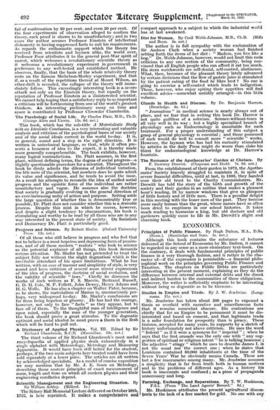Of all those who still believe in progress and who
feel that not to believe is a most hopeless and depressing form of pessim- ism, and of all those modern " realists " who look to science as the potential explainer of all things, this book demands serious attention. Mr. Shafer has not pretended to treat the subject fully nor without the slight dogmatisni which is the inevitable attendant of his space limitations. What he has written, with an ease of manner and simplicity of style, is very sound and keen criticism of several more recent expressions of the idea of progress, the doctrine of social evolution, and the validity of scientific " laws." Chiefly he discusses the works of such writers as F. S. Marvin, Bertrand Russell, G. D. H. Cole, M. P. Follett, John Dewey, Henry Adams and H. G. Wells. He has also a chapter on Walter Pater, because, as he shows, the materialism of Marius is, unconsciously per- haps, very widespread to-day. Mr. Shafer's conclusions are far from being hopeless or gloomy. He has had the courage, however, not only to face facts " as they appear, but to face all of them. To the thoughtful man of intelligence and open mind, especially the man of the younger generation, the book should prove a great stimulus. To the dogmatic optimist and social idealist he must prove a thorn in the flesh which will be hard to pull out.


































































 Previous page
Previous page